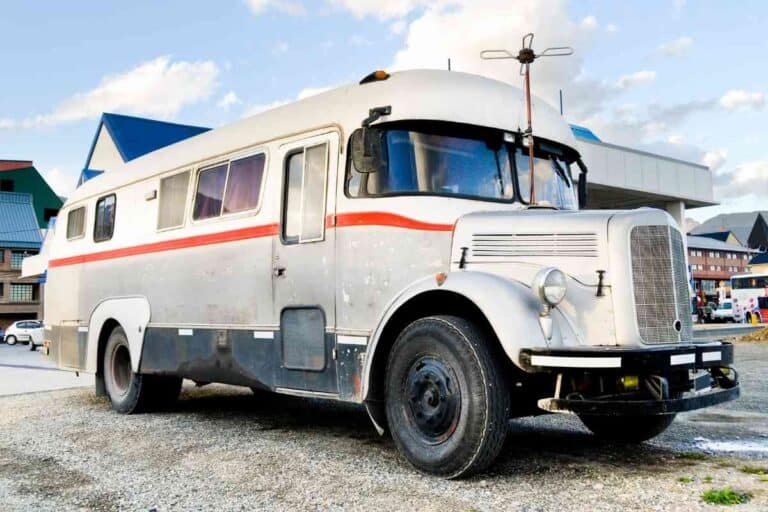Pros and Cons of Living in a Bus
Living in a bus is a very uncommon lifestyle. Buses are unusual even compared to other alternative homes. But it’s not entirely unheard of, and there are many good reasons to convert an old school bus but into a home.
But what are these benefits, and what are the downsides to living in a bus? In this article, we will explore the big pros and cons of living in a bus.
Pros of Living in a Converted Bus
The greatest benefit of living in a bus is freedom. That includes financial freedom, but also and geographic freedom and freedom from a lot of rules and regulations – written and unwritten. Compared to many other hope types, a converted bus is perhaps the freest lifestyle possible.
Affordable
Old busses are very affordable and generally cheaper than RVs of similar age and conditions. That is because there is very little demand for busses that have outserved their use for transporting school children or travelers back and forth.
However, the low cost and low remand for buses come with the risk of acquiring a bus that is in a less than perfect condition. On the one hand, most bussed are well-maintained by the school or company that operates them. They have to be inspected and serviced at regular intervals to keep the passengers safe.
But when a bus is retired, it can often be stored away for years without ever being serviced, and that can lead to all kinds of issues, from molding rubber hoses to cracked wheels and body corrosion. So make sure to inspect the bus throughout before you buy.
Fewer rules
When you are on the move, you are bound by few rules, whether written or social. You don’t have to consider building codes or HOA regulations. You are also free to choose your tax domicile, meaning you can choose a state that doesn’t require you to pay income tax, sales tax, or with less stringent homeschool laws.
Customizable
Compared to RVs, buses are are easier to custom build according to your needs and personal preferences. A bus is essentially a large, rectangular box on wheels, and when the seats have been removed, you have the freedom to do a lot of personalized layout work.
No property taxes
Since property taxes only apply to real estate, and you don’t own any land or buildings, you will not have to pay property taxes. Considering the high level of property taxes, this alone could save you a pretty penny every year.
Live Where You Want and When You Want
Don’t like your neighbors? Is the neighborhood going downhill? Or are you just in the mood for a change of scenery? Just move – no need to sell your home, or even hiring movers, just pack it up and leave.
Cons of Living in a Converted Bus
The biggest downside to living in a bus is that you will have to put a lot of work into building your new home. Both in terms of converting it but also the constant maintenance. You will also have to give up on some of the social upsides to living in a fixed location.
Parking Can Be a Challenge
In some states and counties, there are very strict rules for camping or sleeping in a motor vehicle on public land, and access to private parking depends on the owners. Some businesses, like Walmart, usually allow (or at least do not hinder) people from spending the night on their parking lots, while other places explicitly prohibit it.
While this is less of a challenge for those living in a van, busses are much more subject to scrutiny, making stealth camping more or less an impossibility.
Requires Work to Convert
Unlike RVs, buses need a lot of work before they can be habitable. While they do offer more ways to customize the layout, you will need to spend time and money preparing it.
Depreciation
Your home will have a very low market value, and for each mile driven, it will be worth even less. Not many people are looking to buy a bus, particularly one that can’t be used for its original purpose any longer.
That being said, you may be able to make a little money if you find a buyer who is also dreaming of living in a bus and willing to pay a premium to save themselves from the significant task of converting it from scratch. However, it may not cover the cost of materials and the time it took you to build it in the first place.
The good thing is that you will probably have little to no debt and very few expenses – providing you the financial freedom to save and invest or build a business.
What People Think of You
This may not bother you specifically, but there is a stigma to most types of alternative living, and some people will look askance at you and your bus. You can try and convince them otherwise, but, typically, the best solution is to ignore what random people may say or think.
Remember: it takes a lot more courage to design your own life than to follow the herd.
Widespread Community
As you travel, you will meet many people and have lots of opportunities to grow your network of friends. But those people will be spread out all around the country.
Your life on the move will not be able to offer the same close-knit community that a fixed location can. It can take years to become an integrated part of a local community, but it often has a lot to offer in terms of friendships, mutual support, and security.
Limited Interior Space
Even a large bus is much smaller than most apartments, not to mention houses. To some, that’s a benefit as it forces you to keep your amount of “stuff” down. This can be a great minimalist approach to life, but it can also be challenging. If not for the lack of storage space, then perhaps for the lack of personal space for you and your family.
Maintenance
Any vehicle requires servicing and regular maintenance. Repairing a bus is not cheap, even if you can do a lot of it yourself. Parts are often expensive and not readily available, and not all car mechanics are able to fix a specific mechanical issue.
Besides, if your bus ever needs a complete overhaul done by professionals, you may have to find another place to sleep for a few days.
Difficult to Convert
As mentioned, buses are generally easier to gut and rebuild from scratch than RVs. But whereas an RV is already made to live in for a shorter or longer period of time, buses are not. You will have to convert it before you move in. That includes removing all seats, leveling the floor, building storage space, bathroom, etc. While that can be a fun project, it certainly is a big, time consuming, and potentially costly task.
No Land
Do you ever dream of becoming self-sufficient? If so, living in a bus is probably not for you. You may be able to grow a few potted tomatoes, but nothing more than what would be considered a fun hobby project.
Unless you park your bus on your own land, of course. In which case, many of the benefits of owning a bus go away, and you may benefit more from building a tiny house or a container home. A small home made from one or two shipping containers will last much longer and provide a more comfortable living space.






